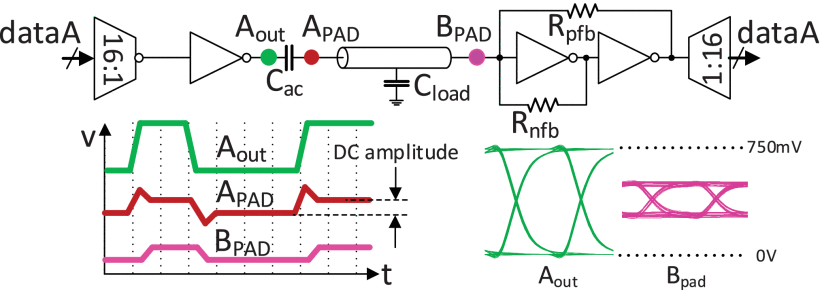A 0.190-pJ/bit 25.2-Gb/s/wire Inverter-Based AC-Coupled Transceiver for Short-Reach Die-to-Die Interfaces in 5-nm CMOS

This article presents an inverter-based short-reach ac-coupled toggle (ISR-ACT) link targeted for short-reach die-to-die communication over silicon interposer or similar high-density interconnect. The ISR-ACT’s transmitter (TX) sends non-return-to-zero (NRZ) data through a small series capacitor to inject low-swing pulses into the line. These pulses are amplified and latched by a two-stage receiver (RX), where the 1st-stage transimpedance amplifier (TIA) amplifies the pulse data and positive feedback around both stages captures the data and maintains the dc level on the line. Achieving low signal swing through a capacitor divider, the ACT driver consumes less than half the power compared to regular rail-to-rail CMOS drivers while providing dc voltage isolation between the driver and the RX. Fabricated in a 5-nm standard CMOS process, the ISR-ACT link, operating on a 0.75-V supply, shows 0.66 UI margin at 25.2 Gb/s/wire over a 1.2-mm on-chip channel and demonstrates an energy efficiency of 0.190 pJ/bit.
Publication Date
Research Area
Copyright
This material is posted here with permission of the IEEE. Internal or personal use of this material is permitted. However, permission to reprint/republish this material for advertising or promotional purposes or for creating new collective works for resale or redistribution must be obtained from the IEEE by writing to pubs-permissions@ieee.org.
